Fleurs du Mal Magazine


Or see the index

‘BOSCH & BRANDS’
ACADEMY OF FINE ARTS VIENNA
Op de grote Jheronimus Bosch-tentoonstellingen in ’s-Hertogenbosch en Madrid schitterde vorig jaar één van Bosch’ meesterwerken door opvallende afwezigheid: het ‘Laatste Oordeel’ (± 1500). Het werk verblijft al sinds de 16e eeuw in Oostenrijk en hangt nu in de ‘Gemäldegalerie’ van de bekende ‘Akademie der bildenden Künste’ in Wenen. Het werk valt op door zijn frisse kleuren. Als eerbetoon aan dit prachtige schilderij nodigt de ‘Akademie’ dit jaar een aantal kunstenaars uit om met hun werk op het drieluik van Jeroen Bosch te reageren. Deze reeks ‘Korrespondenzen’ wordt geopend door een tentoonstelling van de Tilburgse beeldend kunstenaar Sjon Brands, wiens ‘vreemde vogels’ zo uit het rariteitenkabinet van de Bossche schilder lijken te zijn weggevlogen.
 De tentoonstelling ‘Bosch & Brands’ verwelkomt acht beelden van vogels, die in de grote zaal rondom het ‘Laatste Oordeel’ gegroepeerd staan. De overeenkomsten zijn duidelijk aanwezig, beide kunstenaars omarmen met graagte de onvolkomenheden en ondeugden van onze mensheid. De verschillen zijn eveneens treffend, vooral wanneer men de schilder Jheronimus Bosch een gebrek aan humor toedicht. Daar heeft de hedendaagse kunstenaar geen last van, zijn dadaïstische paradijsvogels vormen een uiterst vrolijke verzameling menselijke eigenaardigheden. Wellicht dat zij een ander licht op het eeuwenoude drieluik werpen. Niet alles is hel en verdoemenis.
De tentoonstelling ‘Bosch & Brands’ verwelkomt acht beelden van vogels, die in de grote zaal rondom het ‘Laatste Oordeel’ gegroepeerd staan. De overeenkomsten zijn duidelijk aanwezig, beide kunstenaars omarmen met graagte de onvolkomenheden en ondeugden van onze mensheid. De verschillen zijn eveneens treffend, vooral wanneer men de schilder Jheronimus Bosch een gebrek aan humor toedicht. Daar heeft de hedendaagse kunstenaar geen last van, zijn dadaïstische paradijsvogels vormen een uiterst vrolijke verzameling menselijke eigenaardigheden. Wellicht dat zij een ander licht op het eeuwenoude drieluik werpen. Niet alles is hel en verdoemenis.
Brands laat zich spelenderwijs inspireren door allerlei gevonden gebruiksvoorwerpen en afvalmaterialen. Op de laatste dag van de expositie gaat hij met Weense kinderen aan de slag om met meegebrachte ‘Alltagsgegenständen’ (gebruiksvoorwerpen) nieuwe ‘vreemde vogels’ te maken.
De expositie duurt tot en met zondag 16 juli 2017 en is van dinsdag tot en met zondag geopend van 10:00 tot 18:00 uur. Op zaterdag 15 juli is er om 18.00 uur een gesprek met de kunstenaar en om 19.30 uur een afsluitend concert van de fameuze ‘New Royal Flaminga Band’ (Martin Fondse, Eric van der Westen, Mete Erker en Jan Wirken).
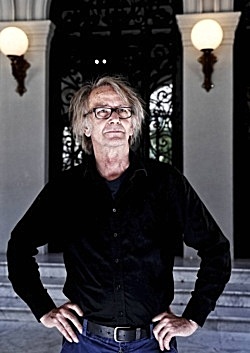 Over Sjon Brands
Over Sjon Brands
De Nederlandse kunstenaar Sjon Brands maakt dadaïstische paradijsvogels en groteske gevleugelde luchtschepen. Absurde wezens samengesteld uit metalen gebruiksvoorwerpen, radiobuizen, struisvogelveren, pollepels en luciferdoosjes. Beelden die regelrecht uit het surrealistisch rariteitenreservaat van Jeroen Bosch lijken te fladderen. Het is een bos bonte karikaturen van ons bestaan, een vrolijke verzameling menselijke eigenaardigheden en ondeugden, die het leven soms ingewikkeld, maar alleszins de moeite waard maken.
Zie ook: www.sjonbrands.nl
Bosch & Brands
Tentoonstelling beelden in de Academie voor schone kunsten: Schilderijengalerij
(Akademia der bildenden Künste – Gemäldegalerie)
Schillerplatz 3, 1010 Wenen
van 23 mei t/m 16 juli 2017.
fleursdumal.nl magazine
More in: Art & Literature News, Brands, Sjon, Dutch Landscapes, Exhibition Archive, Jheronimus Bosch, Sjon Brands

D.H.Lawrence
Bei Hennef
The little river twittering in the twilight,
The wan, wondering look of the pale sky,
This is almost bliss.
And everything shut up and gone to sleep,
All the troubles and anxieties and pain
Gone under the twilight.
Only the twilight now, and the soft “Sh!” of the river
That will last for ever.
And at last I know my love for you is here;
I can see it all, it is whole like the twilight,
It is large, so large, I could not see it before,
Because of the little lights and flickers and interruptions,
Troubles, anxieties and pains.
You are the call and I am the answer,
You are the wish, and I the fulfilment,
You are the night, and I the day.
What else – it is perfect enough.
It is perfectly complete,
You and I,
What more-?
Strange, how we suffer in spite of this.
D.H.Lawrence (1883 – 1930)
Bei Hennef
fleursdumal.nl magazine
More in: Archive K-L, D.H. Lawrence, Lawrence, D.H.

Samuel Taylor Coleridge
Youth And Age a poem
Verse, a breeze ‘mid blossoms straying,
Where Hope clung feeding, like a bee
Both were mine! Life went a-maying
With Nature, Hope, and Poesy,
When I was young!
When I was young? Ah, woeful When!
Ah! for the change ‘twixt Now and Then!
This breathing house not built with hands,
This body that does me grievous wrong,
O’er aery cliffs and glittering sands
How lightly then it flashed along,
Like those trim skiffs, unknown of yore,
On winding lakes and rivers wide,
That ask no aid of sail or oar,
That fear no spite of wind or tide!
Nought cared this body for wind or weather
When Youth and I lived in’t together.
Flowers are lovely; Love is flower-like;
Friendship is a sheltering tree;
O the joys! that came down shower-like,
Of Friendship, Love, and Liberty,
Ere I was old!
Ere I was old? Ah woeful Ere,
Which tells me, Youth’s no longer here!
O Youth! for years so many and sweet
‘Tis known that Thou and I were one,
I’ll think it but a fond conceit
It cannot be that Thou art gone!
Thy vesper-bell hath not yet tolled
And thou wert aye a masker bold!
What strange disguise hast now put on,
To make believe that thou art gone?
I see these locks in silvery slips,
This drooping gait, this altered size:
But Springtide blossoms on thy lips,
And tears take sunshine from thine eyes:
Life is but Thought: so think I will
That Youth and I are housemates still.
Dew-drops are the gems of morning,
But the tears of mournful eve!
Where no hope is, life’s a warning
That only serves to make us grieve
When we are old:
That only serves to make us grieve
With oft and tedious taking-leave,
Like some poor nigh-related guest
That may not rudely be dismist;
Yet hath out-stayed his welcome while,
And tells the jest without the smile.
Samuel Taylor Coleridge (1772 – 1834)
Poem: Youth And Age
fleursdumal.nl magazine
More in: Archive C-D, Coleridge, Coleridge, Samuel Taylor
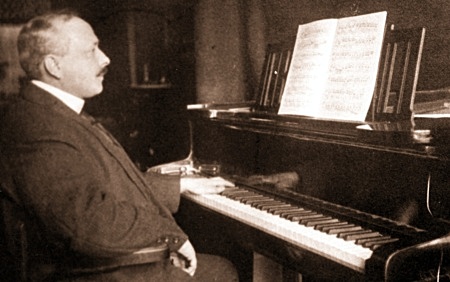
Foto Antony Kok – Archief JVK Tilburg
GESCHIEDENIS VAN EEN BIOGRAFIE
Over Antony Kok
Door Jef en Hanneke van Kempen
‘De wereld van heden raast door in Dada’s voetspoor’ is een veel geciteerd aforisme van de dichter Antony Kok, dat hij schreef toen hij al oud was. Maar was Kok ook de Dada-dichter die auteur K. Schippers in hem zag, in zijn lezing ter gelegenheid van de opening van de grote Kok-tentoonstelling in de Stadsschouwburg / Kultureel Sentrum van Tilburg begin 1985? Bedoelde Kok, zoals K. Schippers zei, dat Dada niet behoorde tot een tijd of een plaats? Dat Dada niet gebonden was aan een beweging. Dat Antony Kok met zijn aforisme moet hebben bedoeld, dat Dada stond voor een mentaliteit, die van alle tijden was en van de hele wereld? 1)
Of was Antony Kok de man die alleen door toeval, door het feit dat hij beste vrienden zou worden met enkele van de grootste kunstenaars van de 20ste Eeuw, Theo van Doesburg( (1883 – 1931) en Kurt Schwitters, en in navolging van hen Dada-dichter werd, zoals J.A. Dautzenberg (1944 – 2009) in 1985 – in een paginagroot artikel- in De Volkskrant schreef: Een Dada-dichter die op latere leeftijd verstrikt zou raken in mystiek. 2)
Of is het allebei waar? Wat helpt het de biograaf die al 35 jaar probeert het leven van een ander te ontrafelen? Is het niet zo dat zowel Hugo Bal als Theo van Doesburg aan het eind van hun leven Rooms-katholiek zijn geworden? Daar hoor je nooit veel over.
Ottevanger haalt in haar zeer degelijke, maar weinig empathische brievenboek, zelfs meer dan eens dichter Til Brugman aan, die Antony Kok omschreef als een : ‘Een wezensvreemde man, die hij altijd al geweest was’. Is dat echt zo? 3)
Zoveel schrijvers, zoveel meningen. Kok is de afgelopen jaren gekenschetst als een wereldvreemde, een absurdist, een socialist, een pacifist, een religieus fanaat, een middeleeuwer, een dadaïst en nog zoveel meer.
# LEES HIER VERDER GeschiedenisVanEenBiografie PDF

Jaargang 35 – 2017 – nummer 1
Tijdschrift Tilburg
Jef van Kempen en Hanneke van Kempen:
Geschiedenis van een biografie. Over Antony Kok
En verder o.a.
Petra Robben: Mijmering over een Mondriaan in Tilburg. Internationale Tentoonstelling van Nijverheid, Handel en Kunst, 1913
Niko de Wit: ‘Den Does’, een uitkijktoren voor Tilburg. Een hommage aan Theo van Doesburg
fleursdumal.nl magazine
More in: - Book News, Antony Kok, Art & Literature News, Bauhaus, BIOGRAPHY, Dada, De Stijl, Doesburg, Theo van, Hanneke van Kempen, Jef van Kempen, Kok, Antony, Kurt Schwitters, Piet Mondriaan, Piet Mondriaan, Schwitters, Kurt, Theo van Doesburg, Theo van Doesburg
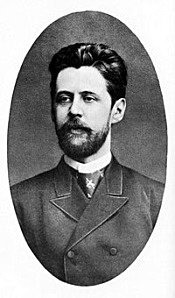
Innokenti Annenski
(1855–1909)
Mijn ideaal
Het ruisen van ontstoken gaslicht
Boven het grauw en grijs bezoek,
De stille weemoed in het aanzicht
Van een terloops vergeten boek,
En dat ik daar dan, onbewogen,
Als ging het immer wonderwel,
Over vergeeld papier gebogen,
Die irritante zijnsvraag stel.
Innokenti Annenski, Идеал, 1904
Vertaling Paul Bezembinder, 2016
Paul Bezembinder studeerde theoretische natuurkunde in Nijmegen. In zijn poëzie zoekt hij in vooral klassieke versvormen en thema’s naar de balans tussen serieuze poëzie, pastiche en smartlap. Zijn gedichten (Nederlands) en vertalingen (Russisch-Nederlands) verschenen in verschillende (online) literaire tijdschriften. Voorbeelden van zijn werk zijn te vinden op zijn website, www.paulbezembinder.nl
fleursdumal.nl magazine
More in: Annenski, Annenski, Innokenti, Archive A-B
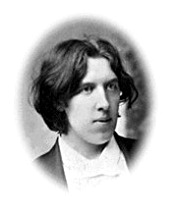 Oscar Wilde
Oscar Wilde
(1854 – 1900)
The Disciple
When Narcissus died the pool of his pleasure changed from a cup of sweet waters into a cup of salt tears, and the Oreads came weeping through the woodland that they might sing to the pool and give it comfort.
And when they saw that the pool had changed from a cup of sweet waters into a cup of salt tears, they loosened the green tresses of their hair and cried to the pool and said, ‘We do not wonder that you should mourn in this manner for Narcissus, so beautiful was he.’
‘But was Narcissus beautiful?’ said the pool.
‘Who should know that better than you?’ answered the Oreads. ‘Us did he ever pass by, but you he sought for, and would lie on your banks and look down at you, and in the mirror of your waters he would mirror his own beauty.’
And the pool answered, ‘But I loved Narcissus because, as he lay on my banks and looked down at me, in the mirror of his eyes I saw ever my own beauty mirrored.’
Oscar Wilde 1894
fleursdumal.nl magazine
More in: Archive W-X, Wilde, Oscar, Wilde, Oscar
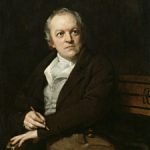
William Blake
The Lamb
Little Lamb, who made thee
Does thou know who made thee
Gave thee life & bid thee feed.
By the stream & o’er the mead;
Gave thee clothing of delight,
Softest clothing woolly bright;
Gave thee such a tender voice.
Making all the vales rejoice:
Little Lamb who made thee
Does thou know who made thee
Little Lamb I’ll tell thee,
Little Lamb I’ll tell thee;
He is called by thy name,
For he calls himself a Lamb:
He is meek & he is mild,
He became a little child
I a child & thou a lamb,
We are called by His name,
Little Lamb God bless thee,
Little Lamb God bless thee.
William Blake (1757 – 1827)
Poem: The Lamb
fleursdumal.nl magazine
More in: Archive A-B, Blake, William
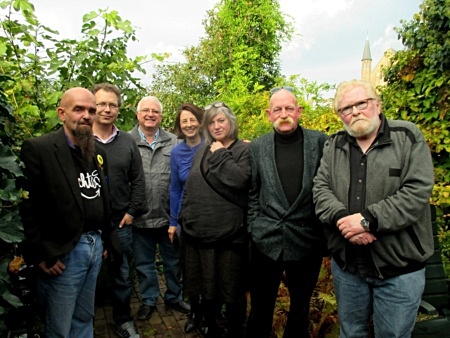
Vertaling van het gedicht Theater van Jef van Kempen in het Zuid-Afrikaans door Bernard Odendaal.
Eerder gepubliceerd door Carina van der Walt in: Versindaba – ‘n Kollektiewe weblog vir die Afrikaanse digkuns –
http://versindaba.co.za/2016/03/31/carina-van-der-walt-jeroen-bosch-se-skilderye/
Theater
Stel je voor: een toneel van dolende nachtvogels
boven een doorweekte woestijn, in een duister
hospitaal voor koortsige landlopers.
Stel je voor: een opera van rondborstige gedrochten,
verwekt in een glazen stolp, amechtig lispelend,
op kromme stelten strompelend, in een vuile
sneeuwjacht van de diepe winter.
Eind goed al goed vonden de trage doden hun draai
en bestegen, tegen de keer, het paard van Troje
en maakten hun dromen waar.
Jef van Kempen
(Uit de bundel ‘Laatste Bedrijf’ 2012)
Teater
Stel jou voor: ’n toneel van dolende nagvoëls
bokant ’n deurweekte woestyn, in ’n donker
hospitaal vir koorsige boemelaars.
Stel jou voor: ’n opera van rondborstige gedrogte
verwek onder ’n glasstolp, uitasem lispelend,
op krom stelte strompelend, morsig aan die
jag in die diepwintersneeuw.
Einde goed alles goed kry die trae dooies hul draai
en bestyg, dwarstrekkerig, die perd van Troje
en maak hulle drome waar.
Vertaling Bernard Odendaal (2016)
FOTO: v.l.n.r. Martin Beversluis, Desmond Painter, Bernard Odendaal, Carina van der Walt, Annelie David, Bert Bevers en Jef van Kempen (foto Nel van Kempen 2015)
fleursdumal.nl magazine
More in: Archive K-L, Archive O-P, Bernard Odendaal, Bevers, Bert, Beversluis, Martin, Carina van der Walt, Jef van Kempen, Kempen, Jef van, Literaire Salon in 't Wevershuisje, TRANSLATION ARCHIVE
 Wim Brands schreef in 2010 op het blog van Tirade: ‘Er werd mij gevraagd of er iemand is die ik me wil blijven herinneren. Ik mocht maar één persoon kiezen. Ik koos mijn grootvader. Aan wie ik wel eens een gedicht heb gewijd dat begon met de regel: “Hij had een bokkenwagen en een kraai.”‘
Wim Brands schreef in 2010 op het blog van Tirade: ‘Er werd mij gevraagd of er iemand is die ik me wil blijven herinneren. Ik mocht maar één persoon kiezen. Ik koos mijn grootvader. Aan wie ik wel eens een gedicht heb gewijd dat begon met de regel: “Hij had een bokkenwagen en een kraai.”‘
Veel van Wim Brands’ anekdotes waren aanleiding tot poëzie. In zes bundels en heel veel tijdschriftpublicaties veroverde Brands zijn plek als dichter, naast zijn groeiende statuur als anchorman van VPRO Boeken, of eigenlijk – bij uitbreiding – als de belangrijke televisiepersoonlijkheid die kunst en literatuur hoog in het vaandel had.
Er is dan ook geen betere manier om kennis te nemen van wat en wie Wim Brands allemaal was dan door lezing van deze Verzamelde gedichten. In de geest van Brands zijn we met de keuze overigens soepel omgesprongen. Er staat een stripverhaal in deze bundel, en er zijn blogs en brieven in te vinden. Voor Brands zijn gedichten verhalen, en hij maakt van verhalen poëzie,steeds door heel goed over de vorm na te denken, door in te dikken en te schrappen – want het kon altijd preciezer.
Deze verzameling toont wat een geweldig dichter Wim Brands was. De bundel bestaat uit zijn verschenen bundels plus veel ongepubliceerd materiaal. Thomas Verbogt schreef een nawoord.
Wim Brands (1959-2016) was een Nederlands dichter, journalist en presentator. Hij publiceerde acht dichtbundels, werkte jarenlang voor de VPRO-radio en presenteerde van 2005 tot 2016 het televisieprogramma Boeken.
Wim Brands schreef in 2010: ‘Er werd mij gevraagd of er iemand is die ik me wil blijven herinneren. Ik mocht maar één persoon kiezen. Ik koos mijn grootvader. Aan wie ik wel eens een gedicht heb gewijd dat begon met de regel: “Hij had een bokkenwagen en een kraai.”’
Veel van Brands’ anekdotes waren aanleiding tot poëzie. Met zijn bundels en vele tijdschriftpublicaties veroverde Brands zijn plek als dichter, naast zijn groeiende statuur als anchorman van VPRO Boeken. Er is dan ook geen betere manier om kennis te nemen van wat en wie Wim Brands allemaal was dan door lezing van deze Verzamelde gedichten. In de geest van Brands is er met de keuze soepel omgesprongen; de verzameling bevat zijn bundels, maar ook niet eerder gepubliceerd werk, blogs, brieven en zelfs een stripverhaal.
Over de poëzie van Wim Brands:
‘De gedichten zijn romantisch van inhoud en nuchter van toon. Ze openen op een haast vanzelfsprekende manier duistere gebieden en dieptes in de geest.’ – De Volkskrant (*****)
‘Mooie gedichten, die op een terloopse manier een raadselachtigheid behouden.’ – Het Parool
Wim Brands
Verzamelde gedichten
ISBN 9789028261921
Van Oorschot 2017, € 27,50
fleursdumal.nl magazine
More in: - Book News, Archive A-B, Art & Literature News, AUDIO, CINEMA, RADIO & TV, Brands, Wim
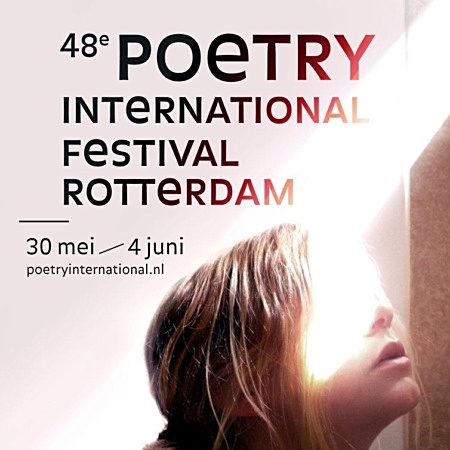
Op dinsdag 30 mei 2017 opent de 48e Poetry International in de Rotterdamse Schouwburg, aansluitend vindt het festival plaats tot en met zaterdag 3 juni in de zaal van het Ro Theater aan de William Boothlaan.
Voor de achtenveertigste keer haalt Poetry International de beste dichters uit alle windstreken naar Rotterdam. Naast gedichten in uiteenlopende talen brengt het festival een randprogramma met film, muziek, interviews, themabijeenkomsten en masterclasses. Een reis langs verre culturen met de kunst van het woord als brandstof. Iedereen is uitgenodigd op het jaarlijkse feest van de poëzie.
Op dinsdag 30 mei gaat het 48e Poetry International Festival van start in de Rotterdamse Schouwburg. Van woensdag 31 mei tot en met zondag 4 juni wordt het festival vervolgd in het Ro Theater aan de William Boothlaan en op verschillende andere locaties in het Witte de With Kwartier. Voor de achtenveertigste keer haalt Poetry International de beste dichters uit alle windstreken naar Rotterdam. Naast poëzievoordrachten in uiteenlopende talen brengt het festival films, muziek, interviews, lezingen, themabijeenkomsten en masterclasses. Een kermis van verlangen, kritiek, avontuur en troost, met de kunst van het woord als brandstof. Iedereen is uitgenodigd op het jaarlijkse feest van de poëzie.
Roberto Amato (ITA)
Mischa Andriessen (NLD)
Hannah van Binsbergen (NLD)
Dumitru Crudu (MDA)
Mária Ferenčuhová (SVK)
Gozo Yoshimasu (JAP)
Stefan Hertmans (BEL)
Ishion Hutchinson (JAM)
Mookie Katigbak-Lacuesta (PHL)
Anne Kawala (FRA)
John Kinsella (AUS)
Harry Man (GBR)
Marianne Morris (CAN / GBR)
Cees Nooteboom (NLD)
Michael Palmer (USA)
Margarida Vale de Gato (PRT)
Jan Wagner (DEU)
Mae Yway (MMR)
Zang Di (CHN)
Zhu Zhu (CHN)
48e Poetry International 30 mei – 4 juni 2017
Het jaarlijkse feest van de internationale poëzie
# Meer info op website Poetry International
fleursdumal.nl magazine
More in: - Book Lovers, Art & Literature News, POETRY ARCHIVE, Poetry International
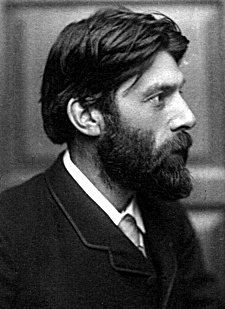
Robert Bridges
A Toast to our Native Land
Huge and alert, irascible yet strong,
We make our fitful way ‘mid right and wrong.
One time we pour out millions to be free,
Then rashly sweep an empire from the sea!
One time we strike the shackles from the slaves,
And then, quiescent, we are ruled by knaves.
Often we rudely break restraining bars,
And confidently reach out toward the stars.
Yet under all there flows a hidden stream
Sprung from the Rock of Freedom, the great dream
Of Washington and Franklin, men of old
Who knew that freedom is not bought with gold.
This is the Land we love, our heritage,
Strange mixture of the gross and fine, yet sage
And full of promise destined to be great.
Drink to Our Native Land! God Bless the State!
Robert Seymour Bridges (1844 – 1930)
A Toast to our Native Land
fleursdumal.nl magazine
More in: Archive A-B, Bridges, Robert
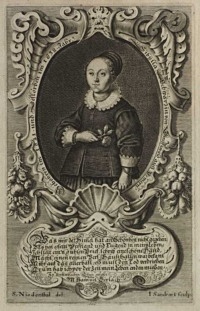
Sibylla Schwarz
Epigramma
Du meinst ich soll dein noch gedencken und dich lieben,
ob du mich schon verläst, ey sey doch nicht so toll,
Ich habe dir ja offt vor disem schon geschrieben:
Daß niemand Eysen, Stein und Klöze lieben soll.
Sibylla Schwarz (1621 – 1638)
Gedicht: Epigramma
fleursdumal.nl magazine
More in: Archive S-T, SIbylla Schwarz
Thank you for reading Fleurs du Mal - magazine for art & literature